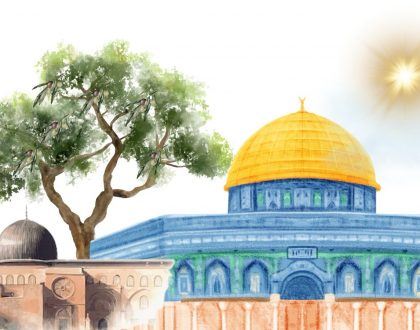Continuing Relevance of Religion in Today’s Society
by Hana
In our advancing and increasingly secular society, many people hold the opinion that religion is backward and does not have any benefit. In actual fact, even though Islam’s teachings haven’t changed in the last millennium and a half, it still says many things which have a huge amount of relevance even today.
After the people of Makkah converted to Islam, the Muslims returned from Madinah, where they had been living, to perform Hajj. During Hajj the Prophet Muhammad* made a speech, similar to Jesus’ Sermon on the Mount. He died within the following year, so this speech is commonly referred to as the ‘last sermon’, summing up his twenty three years of preaching. Many of the things he says still apply to today’s society.
‘O People, it is true that you have certain rights with regard to your women, but they also have rights over you.’
This point is pretty self-explanatory – treat women well. The message of Islam has become twisted and diluted by cultural traditions over time, but true Islam actually supports feminism, giving women rights that in the Western world they have only gained within the last 200 years. Even now we see inequality between genders in salary gaps, few women in senior corporate positions, etc. but 1400 years ago in the Middle East, an area now thought of as backward and oppressive, women were respected businesswomen, scholars, doctors and even soldiers.
‘Learn that every Muslim is a brother to every Muslim, and that the Muslims constitute one brotherhood. Nothing shall be legitimate to a Muslim which belongs to a fellow Muslim unless it was given freely and willingly.’
In this part of the sermon the Prophet* is instructing Muslims not to steal, and is emphasising the point that if you steal something from another person then that object does not truly belong to you. Crime is still a major problem in the world and the number of robberies in London has been rising since 2008.
‘All mankind is from Adam and Eve, an Arab has no superiority over a non-Arab nor a non-Arab has any superiority over an Arab; also a white has no superiority over black nor a black has any superiority over white.’
From this quotation we understand that in Islam all people are considered equal. It teaches us that no matter what religion or culture anyone is, there is no reason to treat them differently. This is important for us today as racism is still an issue in every sector, from the Oscars, to the job market, to police brutality.
Some years later, the second Caliph, Umar**, on his deathbed, said some similar things.
‘Be kind and generous to the Muslims. Those out of them who are good, be good to them; those who are bad overlook their lapses.’
Here Umar** is telling his successor to look after his people. He says that they should reward good action, but also look past mistakes and allow people to move on.
‘I instruct you to be good to the non-Muslims for they are your responsibility. Do not tax them beyond their capacity. Ensure that they pay without undue inconvenience.’
Non-Muslims should be looked after but allowed to live in peace and make their own rules, and paying taxes should not be made unreasonably difficult for them. In fact, Umar** did a lot for the non-Muslims under his jurisdiction. It was under his rule that Jerusalem was first taken over by the Muslims. He came himself to receive the key to the city and was invited to pray in the Church of the Holy Sepulchre, but declined so as not to give the wrong impression and endanger the church’s status as a Christian site. It was also under Umar** that the Jewish people were allowed back into the city, after they had been kept out by the Byzantines for centuries, after which all three religions coexisted cooperatively until the Crusades five hundred later.
In his own community, back in Madinah, Umar** once passed a blind Jewish beggar. Without telling him who he was, he invited him back to his own house, where he fed him before taking him to the treasury. He instructed that this man and others like him should be taken care of as they had paid taxes when they were young and able so should be looked after now when they were no longer, thereby introducing the first disability benefits and pensions.
‘With regard to the people, I enjoin upon you to administer justice with an even hand. See that all the legitimate requirements of the people are met. Be concerned for their welfare. Ensure the safety of their person and property.’
He tells his successor to rule fairly and without prejudice, and to look after and protect everyone they rule over, no matter what their situation is.
‘In the matter of administration do not prefer the rich to the poor… Treat all the people as equal. Be a pillar of strength for those who are weak and oppressed. Those who are strong but do wrong, make them pay for their wrong-doings. In the distribution of wealth and other matters be above nepotism. Let no consideration of relationship or selfish interest weigh with you.’
He makes it clear that the needy should be treated well, that the wealthy should not be favoured in anything and that the leaders should be above bribery and selfishness when it comes to matters of state. This is particularly relevant in recent times, when there have been allegations made against huge numbers of politicians around the world for being corrupt or self-serving. A few years ago, MPs all over Britain were shamed and humiliated over their finances; many had been claiming money for work-related expenses that were in fact not related to their job at all. For example, Conservative MP Peter Viggers claimed over £30 000 for gardening, which included maintenance of a pond referred to as a ‘floating duck island’.
During his caliphate, Umar** also introduced the first ever child benefits. He was once standing guard over a caravan, and during the night heard a baby crying. When the mother was incapable of quieting him, he enquired after her situation and discovered that the reason was that she could not afford to feed it. As a result, he ordered that every child receive a regular stipend, a proclamation that was then implemented throughout the lands under Muslim rule.
*peace be upon him
**may God be pleased with him
Written by Hana Khan in 2016
Recommended Posts

Masjid al Aqsa – why it has a very special place in our hearts
November 29, 2023

Palestine: The Holy Land
November 23, 2023

70 acts of kindness
November 13, 2023
